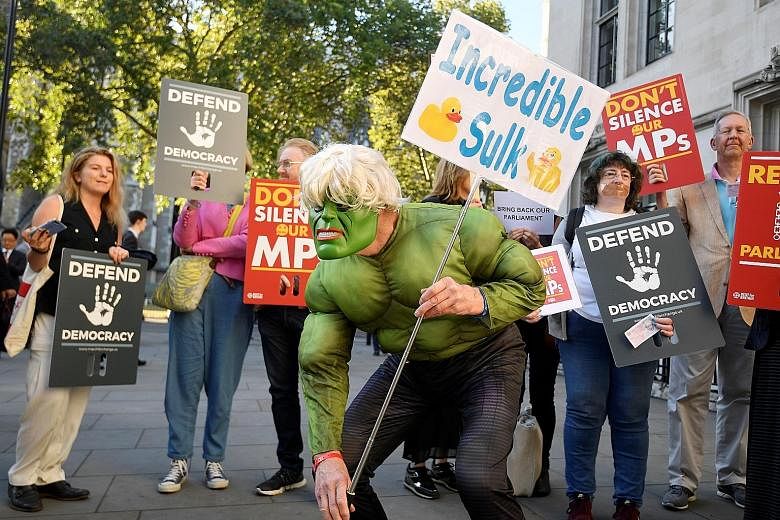LONDON • Britain's top court met yesterday to consider whether a decision by Prime Minister Boris Johnson to suspend Parliament until shortly before the date for Brexit was illegal.
Scottish judges ruled last week that the suspension was unlawful and supporters of the legal challenge in the Supreme Court want Parliament recalled immediately if it rules against Mr Johnson's decision. Critics say he should quit if the judges rule against him.
Mr Johnson announced on Aug 28 that he had asked Queen Elizabeth II to prorogue, or suspend, Parliament for five weeks from last week until Oct 14. He said the shutdown was necessary to allow him to introduce a new legislative agenda.
Opponents said the real reason was to prevent scrutiny and challenges by Parliament - where he now has no majority - to his Brexit plans, especially his promise to leave the European Union by Oct 31 even if no divorce deal has been agreed.
In a damning judgment last Wednesday, Scotland's highest court said the suspension was an "egregious" attempt to stymie Parliament.
A week earlier, the High Court of England and Wales rejected a similar case, saying the matter was political and not one for judicial interference.
Both cases are now before the Supreme Court, the highest judicial body in Britain. Its 11 judges will decide how far Britain's unwritten constitution limits the power of the Prime Minister and whether Mr Johnson's advice to the Queen was therefore illegal.
"That this is a serious and difficult question of law is amply demonstrated by the fact that three senior judges in Scotland have reached a different conclusion from three senior judges in England and Wales," said Ms Brenda Hale, president of the Supreme Court.
"The Supreme Court exists to decide such difficult questions of law and we shall do so in accordance with our judicial oaths."
Launching the legal challenge to Mr Johnson's decision - by a mixture of anti-Brexit campaigners and opposition lawmakers - Mr David Pannick said that there was strong evidence the Prime Minister had wanted to silence Parliament because he saw it as an obstacle.
Mr Johnson has said that lawmakers would have plenty of time to discuss Brexit again after an EU summit on Oct 17-18. In a television interview yesterday, Mr Johnson said he had "the greatest respect for the judiciary" but declined to say whether he would recall Parliament if the ruling goes against the government.
REUTERS











